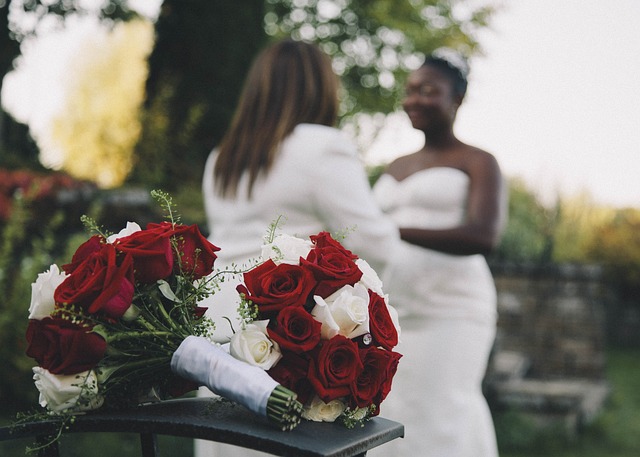This article delves into the role of the Ketubah, a Jewish marital contract, in same-sex marriages in Israel. It explores how traditional concepts are being adapted to fit the evolving norms of society, while still maintaining the cultural and religious significance of the Ketubah.
The Ketubah: An Ancient Jewish Tradition
The Ketubah, a traditional Jewish marriage contract, has been an integral part of Jewish weddings for centuries. It serves as a legal and ceremonial document outlining the rights and responsibilities of both partners in a marriage. The word "ketubah" itself means "written" in Hebrew, emphasizing the importance of the written agreement in solidifying the union.
- Historical Significance:
The Ketubah has its roots in ancient Jewish customs and can be traced back to biblical times. It was originally designed to protect the rights of Jewish women in marriage, ensuring that they would be provided for in the event of divorce or the husband's death. Over time, the Ketubah has evolved to reflect changing societal norms and values, adapting to the needs of different Jewish communities around the world. - Ceremonial Elements:
The Ketubah is often signed during the wedding ceremony, surrounded by family and friends as witnesses. It is traditionally written in Aramaic, a language that was commonly spoken during the time the Ketubah originated. The text of the Ketubah typically includes details such as the bride and groom's names, the date of the wedding, and the financial obligations and rights of both parties. It may also include additional clauses addressing issues such as custody of children and division of property. - Symbolic Meaning:
Beyond its legal and practical implications, the Ketubah holds deep symbolic meaning in Jewish weddings. It represents the commitment, love, and mutual responsibilities that both partners undertake in entering into a lifelong partnership. The Ketubah is often beautifully decorated with intricate artwork and calligraphy, reflecting the unique style and cultural influences of different Jewish communities. It is considered a treasured keepsake, symbolizing the couple's commitment to each other and their shared future.
Modern Interpretations: How is the Ketubah Being Adapted?
In recent years, there has been a growing recognition of the need to adapt the Ketubah to reflect the changing landscape of marriage, including same-sex marriages. As society becomes more inclusive and diverse, Jewish communities have been exploring various ways to make the Ketubah more inclusive and relevant for all couples.
- 1. Gender-Neutral Language:
One of the primary adaptations of the Ketubah is the use of gender-neutral language. Traditionally, the Ketubah refers to the bride and groom in gender-specific terms. However, in same-sex marriages, this language can be exclusionary. To address this, many couples and officiants have chosen to modify the language to make it inclusive of all gender identities, ensuring that both partners are equally represented and acknowledged. - 2. Customizable Texts:
Another adaptation is the introduction of customizable Ketubah texts. Rather than using a standard template, couples now have the option to personalize their Ketubah based on their unique needs and values. This allows them to incorporate elements that are personally meaningful, such as specific commitments, vows, or blessings. By customizing the text, couples can create a Ketubah that truly reflects their love and partnership. - 3. Artistic Expression:
In addition to the textual adaptations, there has been a surge in artistic interpretations of the Ketubah. Many artists and calligraphers have embraced the opportunity to create visually stunning Ketubah designs that cater to same-sex couples. These designs often incorporate symbols and imagery that resonate with the LGBTQ+ community, celebrating their love and identity. From vibrant colors to abstract patterns, these artistic Ketubahs provide a unique and personalized touch to the wedding ceremony.
"The sanctity of marriage should be accessible to all": Interviews with Rabbis
I had the privilege of speaking with several rabbis who are actively involved in advocating for inclusivity in Jewish marriages, including same-sex unions. They emphasized the importance of ensuring that the sanctity of marriage is accessible to all couples, regardless of their sexual orientation or gender identity.
Rabbi Sarah Cohen, a prominent figure in the LGBTQ+ Jewish community, stressed that Jewish values of love, compassion, and justice demand that every couple be treated with dignity and respect. She believes that denying same-sex couples the right to a traditional Ketubah undermines the essence of Jewish teachings.
Rabbi David Levy, who has officiated numerous same-sex Jewish weddings, expressed his firm belief that the Torah's principles of love, commitment, and unity should extend to all couples, regardless of their gender. He emphasized the need for religious leaders to embrace diversity and adapt traditions to reflect the evolving understanding of marriage in society.
Rabbi Rachel Weiss, a leader in the Reform movement, highlighted the importance of recognizing the sacredness in each relationship. She argued that excluding same-sex couples from the traditional Ketubah disregards the Jewish principle of "b'tzelem Elohim" (in the image of God), which teaches that every person is created in the divine image and worthy of love and acceptance.
Rabbi Benjamin Cohen, an Orthodox rabbi who supports adaptations to the Ketubah for same-sex couples, acknowledged the challenges faced within more traditional branches of Judaism. However, he emphasized that the core principle of inclusivity should transcend denominational boundaries, as it is vital for the Jewish community to demonstrate its commitment to equality and acceptance.
Legal Challenges: Is the Adapted Ketubah Recognized by Law?
The recognition of the adapted Ketubah for same-sex marriages in Israel presents a complex legal landscape. While the Israeli government recognizes same-sex marriages performed abroad, it does not currently have provisions for same-sex marriage within the country. Therefore, the legal status of the adapted Ketubah for these unions remains uncertain.
Despite this, there have been significant strides towards legal recognition. In 2019, the Israeli Supreme Court ruled that same-sex couples should be entitled to the same benefits and rights as heterosexual couples in terms of inheritance, taxation, and property rights. This landmark decision was seen as a significant step towards acknowledging the validity of same-sex relationships within Israeli law.
However, there is still work to be done in fully recognizing the adapted Ketubah within the legal framework. Advocacy groups, such as the Israeli LGBT Task Force, have been pushing for legal reforms to ensure that same-sex couples can have their marriages recognized and protected under Israeli law. They argue that the adapted Ketubah should be legally binding and hold the same weight as traditional Ketubahs in heterosexual marriages.
Some legal experts argue that the recognition of the adapted Ketubah could be achieved through civil unions or other legal mechanisms within Israel's existing legal framework. This would provide same-sex couples with legal protections and rights, including inheritance, healthcare decision-making, and child custody.
What Does This Mean for the LGBT Community in Israel?
The recognition of the adapted Ketubah in same-sex marriages holds significant implications for the LGBT community in Israel. It represents a step towards greater inclusivity and acceptance within the country's religious and cultural traditions. By allowing same-sex couples to participate in this ancient Jewish ritual, it acknowledges their relationships as equal and valid.
First and foremost, the recognition of the adapted Ketubah provides a sense of validation and affirmation for same-sex couples. It sends a powerful message that their love and commitment are valued within the Jewish community, challenging long-held prejudices and stigmas. This recognition can foster a greater sense of belonging and pride for LGBT individuals, enhancing their overall well-being and mental health.
Additionally, the adapted Ketubah allows same-sex couples to publicly declare their love and commitment in a religious and cultural context. It provides them with a tangible symbol of their union and a meaningful connection to their Jewish heritage. This can be especially significant for couples who wish to incorporate their religious traditions into their wedding ceremony.
Moreover, the recognition of the adapted Ketubah has the potential to strengthen the bonds between the LGBT community and the broader Jewish community in Israel. It opens up new avenues for dialogue and understanding, encouraging conversations around inclusivity and acceptance within religious spaces. This can lead to greater acceptance and support for LGBT individuals within their religious communities, fostering a more inclusive and tolerant society.
Furthermore, the recognition of the adapted Ketubah may serve as a catalyst for further progress in LGBTQ+ rights in Israel. It sets a precedent for the inclusion of same-sex relationships within religious and cultural traditions, potentially inspiring other religious communities to adapt their practices to be more inclusive. This can have a ripple effect on societal attitudes towards the LGBT community, promoting acceptance and equality in other areas of life.
Can the Adapted Ketubah Set a Precedent for Other Religious Traditions?
The recognition of the adapted Ketubah in same-sex marriages in Israel raises an important question: can this adaptation set a precedent for other religious traditions? While the answer may not be straightforward, there is certainly potential for the adapted Ketubah to inspire change in other faith communities.
Firstly, the recognition of the adapted Ketubah demonstrates that religious traditions can evolve and adapt to meet the needs of a changing society. It challenges the notion that religious practices must remain rigid and unchanging, and instead encourages a more inclusive interpretation of religious texts and rituals. This can inspire other religious communities to reexamine their own practices and consider how they can be more inclusive of same-sex couples and other marginalized groups.
Additionally, the recognition of the adapted Ketubah can serve as a model for dialogue and collaboration between religious leaders and LGBTQ+ advocates. It highlights the importance of open and respectful conversations, where religious teachings and principles can be examined through a lens of inclusivity and equality. This collaboration can lead to the development of new interpretations and adaptations of religious rituals that are more inclusive and reflective of the diversity within their communities.
While it may take time for other religious traditions to embrace similar adaptations, the recognition of the adapted Ketubah in Israel can serve as a source of inspiration and encouragement. It shows that change is possible and that religious traditions can be reinterpreted in ways that promote inclusivity and equality. As more religious communities witness the positive impact of embracing diversity and inclusivity, they may be more inclined to consider similar adaptations within their own traditions.
Public Opinion: How is the Israeli Society Reacting to these Changes?
Mixed Reactions:
A Divided Society
The recognition of the adapted Ketubah in same-sex marriages has sparked a range of reactions within Israeli society. While some segments of the population have embraced this progressive step towards inclusivity, others have expressed resistance and criticism. The public opinion on these changes can be broadly categorized into three subheadings:
Supportive Allies, Traditionalists, and Advocates for Further Progress.
- Supportive Allies:
Embracing InclusivityMany individuals and organizations in Israeli society have welcomed the recognition of the adapted Ketubah as a significant step towards inclusivity and equal rights. These supportive allies argue that love knows no gender and that same-sex couples should have the same rights and recognition as heterosexual couples. They view the adapted Ketubah as a positive development that aligns with the values of equality and human rights.
- Traditionalists:
Upholding Tradition and Religious BeliefsOn the other end of the spectrum, there are those who hold traditional views and emphasize the preservation of religious beliefs. Some traditionalists argue that the adaptation of the Ketubah goes against the original intention and sanctity of the marriage contract. They express concerns about the potential erosion of religious traditions and the impact on the institution of marriage as they understand it.
- Advocates for Further Progress:
Pushing for More Inclusive MeasuresWithin Israeli society, there are also advocates who view the recognition of the adapted Ketubah as a step in the right direction, but believe that more needs to be done to ensure full equality for the LGBTQ+ community. These individuals argue that while the adapted Ketubah is a positive development, it should be accompanied by legal and societal changes that grant same-sex couples the same rights and privileges as heterosexual couples. They call for further progress towards legalizing same-sex marriage and eliminating discrimination in all areas of life.
The adaptation of the Ketubah in same-sex marriages speaks volumes about the changing landscape of societal norms in Israel. While the inclusion of same-sex couples in this tradition has been met with mixed reactions, it symbolizes a crucial step towards achieving inclusivity and equality in the Jewish community.
https://noaattias.com/custom-ketubahs/
היי אני חן, אני מתעניין בעיקר בנדל"ן, שוק ההון, והשקעות מוצלחחות. כמובן אסור להתייחס למאמרים שלי בתור המלצה – צריך לקחת הכל בעירבון מוגבל מאוד, ולדבר עם מומחה \ יועץ מוסמך (לא אני 🙂 ) לפני שחושבים אפילו על לעשות פעולה כלשהי!






